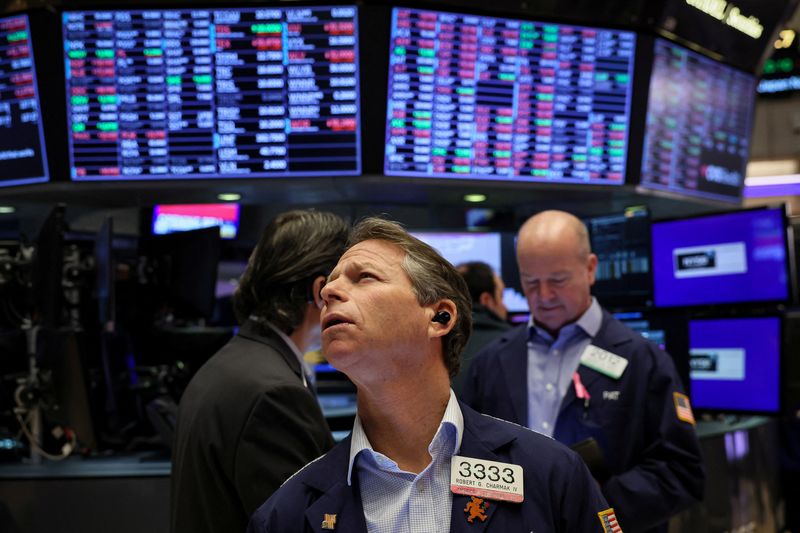By Chuck Mikolajczak
NEW YORK (Reuters) -U.S. stocks closed little changed on Thursday as news of hotter-than-expected inflation and signs of labor market strength dampened hopes for early interest rate cuts by the Federal Reserve this year, but a fall in Treasury yields kept declines in check.
In a choppy session, equities opened higher and the benchmark S&P 500 briefly surpassed its record closing high of 4,796.56, hit in January 2022, before erasing initial gains.
After ending 2023 with a strong rally, stocks have struggled to find upward momentum, with the S&P 500 up only 0.21% on the year, as mixed economic data and Fed officials' comments have led investors to scale back expectations for the timing and size of any rate cuts from the U.S. central bank this year.
The U.S. Labor Department reported that consumer prices rose more than expected in December, with Americans paying more for shelter and healthcare. A separate report showed the number of people filing new claims for unemployment benefits unexpectedly fell last week to 202,000.
"They're just understanding it for what it was. The thing that pushed it up was primarily shelter," said Scott Ladner, chief investment officer at Horizon Investments in Charlotte, North Carolina.
"Nobody believes that is going to be a persistent go-forward problem apart from inflation, so the thing that drove the 'hot print' was something that everybody's kind of discounting."
Comments from some Fed officials have pushed back on potential rate cuts. On Thursday, Cleveland Fed President Loretta Mester and Richmond Fed President Tom Barkin said consumer price data for December did little to assure them inflation is now on a steady track back to the central bank's 2% target, with more information needed before any decision to begin reducing rates.
At 4:11 p.m. the Dow Jones Industrial Average rose 15.29 points, or 0.04%, to 37,711.02. The S&P 500 lost 3.21 points, or 0.07%, at 4,780.24 and the Nasdaq Composite gained just 0.54 points, at 14,970.19.
A fall in Treasury yields helped keep losses for equities in check, after an auction of $21 billion in 30-year bonds was well received.
"People are still worried about supply in the Treasury market. ... Is there going to be sufficient demand to soak that all up? And especially at the long end, the real fear is at the long end and the auction today, it was just perfect," said Ladner.
Microsoft (NASDAQ:MSFT) briefly overtook Apple (NASDAQ:AAPL) as the world's most valuable company, after the iPhone maker's shares dropped nearly 4% since the year began due to concerns over falling demand. Microsoft's shares rose 0.49%, while Apple shed 0.32%.
Nearly all of the S&P 500's 11 major sectors declined, with only energy and technology in positive territory, up 0.16% and 0.44%, respectively.
Crypto stocks reversed early gains and tumbled, with names such as Coinbase (NASDAQ:COIN) off 6.7%, Bitfarms down 13.33% and Riot Platforms (NASDAQ:RIOT) 15.82% lower. The U.S. securities regulator approved the first U.S.-listed exchange-traded funds (ETF) to track spot bitcoin late on Wednesday.
Citigroup fell 1.77% after a filing showed the lender booked about $3.8 billion in combined charges and reserves that will erode its fourth-quarter earnings, due to be reported on Friday.
Other banks including fell, with JPMorgan Chase (NYSE:JPM), down 0.42%, Bank of America, down 1.33% and Wells Fargo off 0.08% ahead of their earnings reports on Friday.
Declining issues outnumbered advancers for a 1.3-to-1 ratio on the NYSE and a 1.8-to-1 ratio on the Nasdaq.

The S&P index recorded 40 new 52-week highs and one new low, while the Nasdaq recorded 109 new highs and 138 new lows.
Volume on U.S. exchanges was 11.41 billion shares, compared with the 12.27 billion average for the full session over the last 20 trading days.
